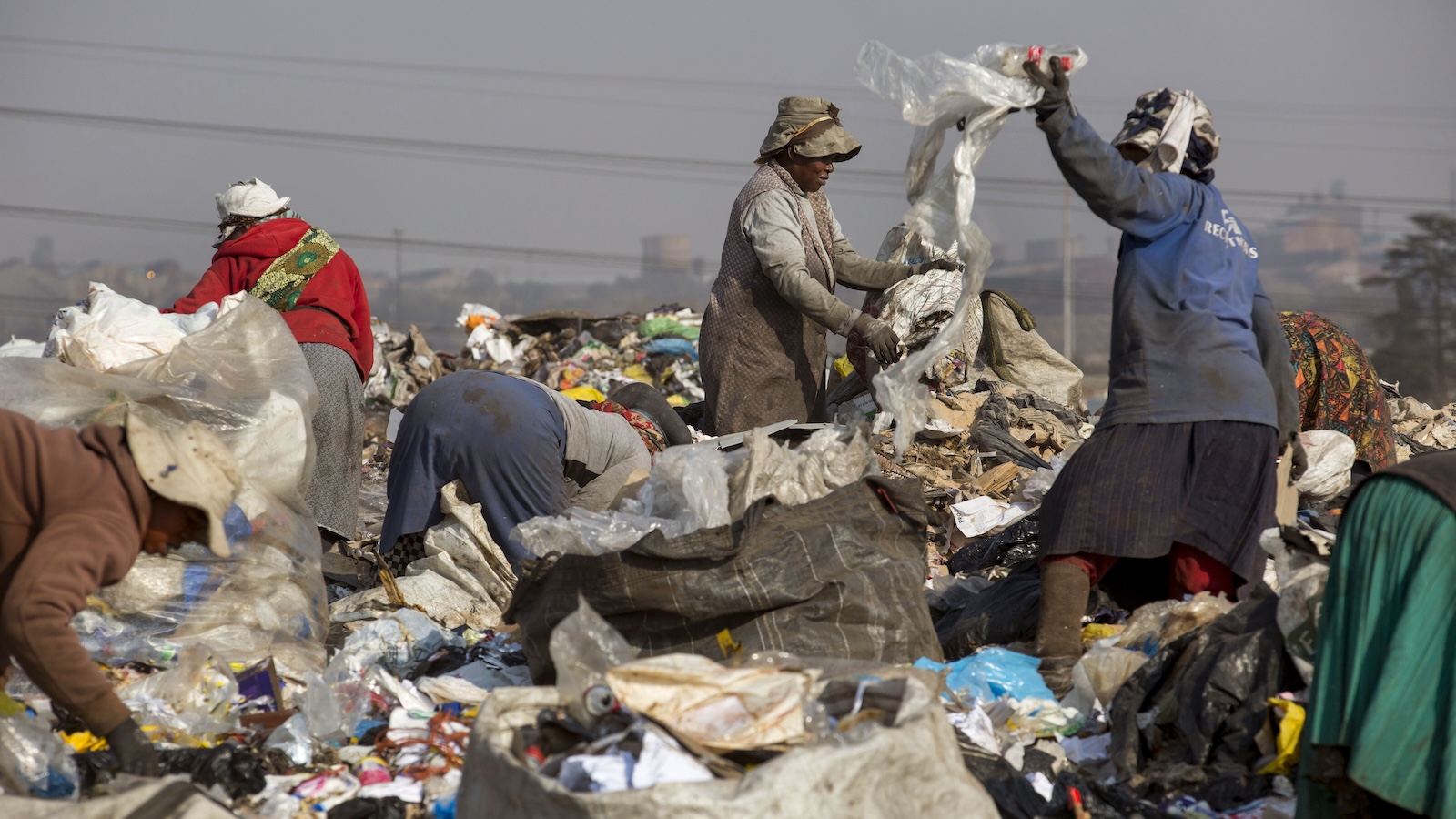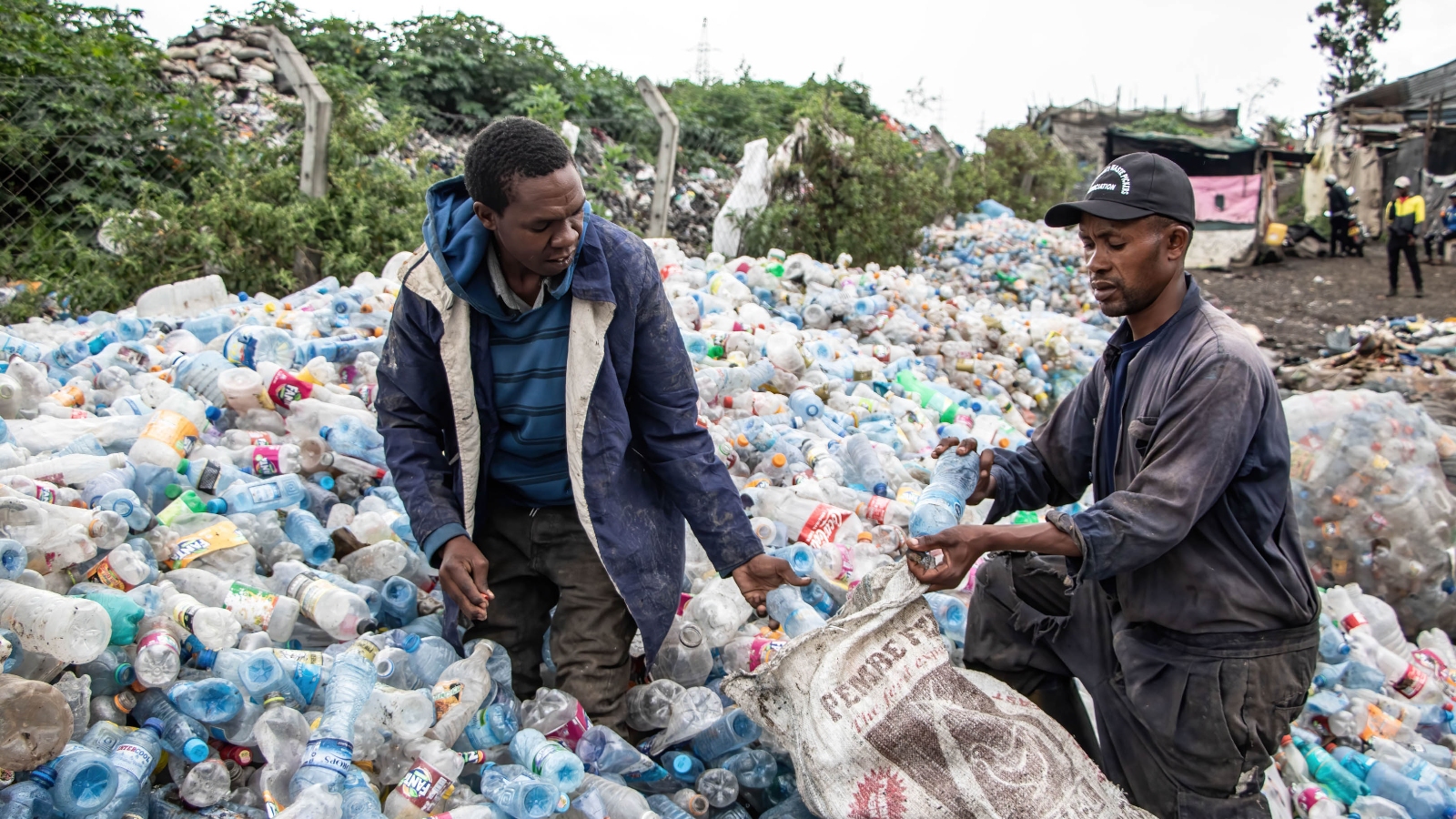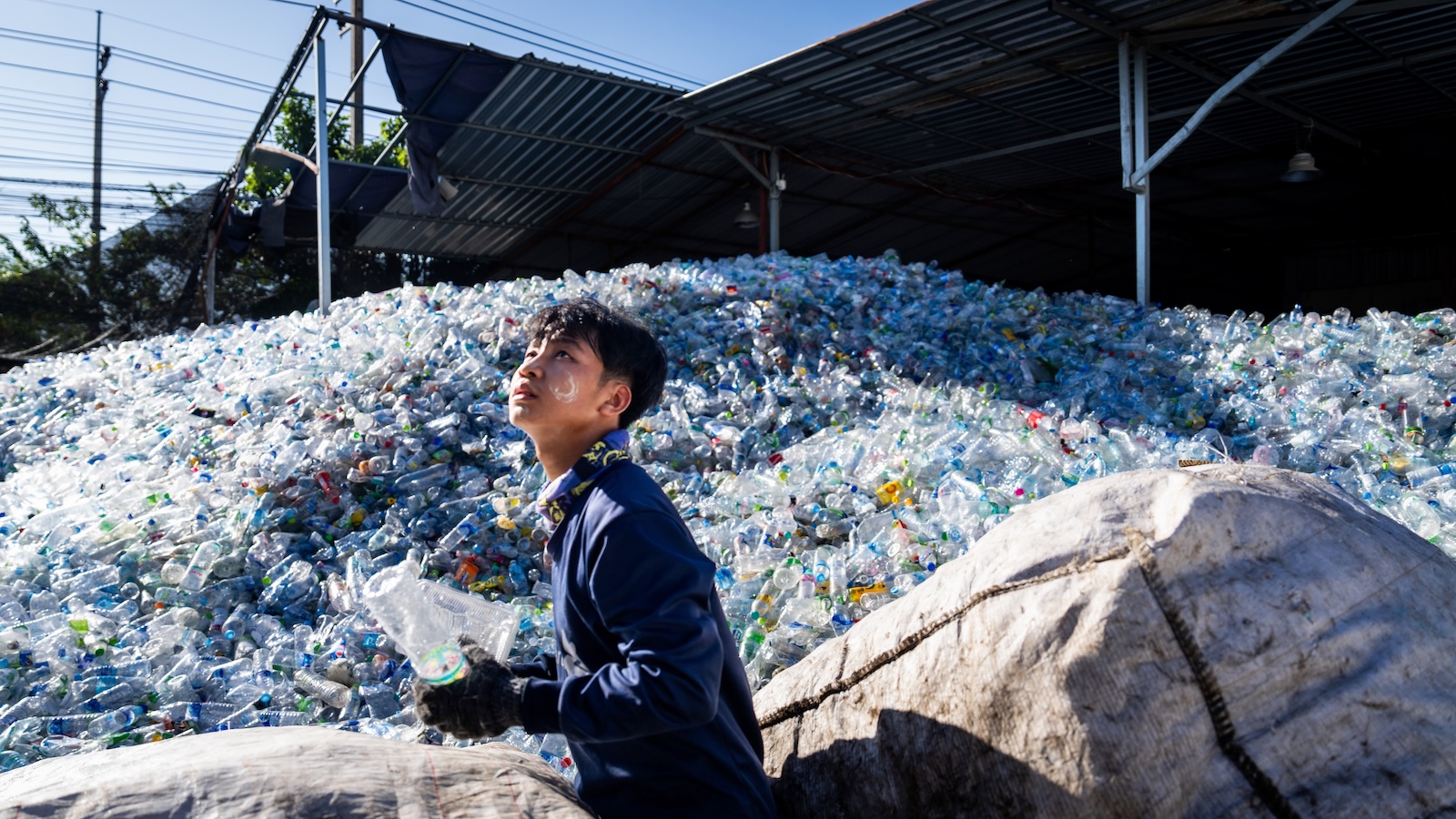Around the world, an estimated 20 million people make a living by collecting discarded plastic, aluminum, and other refuse from dumpsites and landfills and selling it to recyclers. They’re called “waste pickers,” and though their work is essential — they round up nearly 60 percent of all the postconsumer plastic waste that gets collected for recycling — it is often unacknowledged, unremunerated, and underappreciated.
Change may be on the horizon, however, due to a 2022 agreement from United Nations member states to draft a legally binding treaty by 2025 to “end plastic pollution.” Thanks to advocacy from a small group of waste pickers, the treaty mandate recognized “the significant contribution made by workers in informal and cooperative settings,” using a euphemism often understood to refer to waste pickers. It recommended that, over the next two years of scheduled negotiations, delegates consider “lessons learned and best practices” from these informal and cooperative settings.
Now, four negotiating sessions later, the global plastics treaty has given waste pickers an unprecedented boost in visibility. The most recent draft of the agreement refers to waste pickers explicitly — albeit in brackets indicating the need for further discussion — and virtually every stakeholder involved has something to say about their importance in waste management and in shaping the treaty.
“We’ve been unusually successful in these negotiations in highlighting the importance of waste pickers,” said Taylor Cass Talbott, advocacy coordinator for the International Alliance of Waste Pickers, or IAWP, a group that promotes the interests of nearly half a million waste pickers across 34 countries. “If this language sticks,” she added, “this is pretty historic, not just for waste pickers but for the representation of labor within a multilateral environmental agreement.”
Perhaps counterintuitively, those offering statements of support include the plastic companies and industry groups whose plastic trash gets cleaned up by waste pickers. In a document submitted to the U.N. Environment Programme before the treaty’s third negotiating session last year, the American Chemistry Council — the United States’ main petrochemical industry trade group — said the agreement should “uplift developing economies and the informal sector.” Likewise, the International Council of Chemical Associations and the American Fuel and Petrochemical Manufacturers said in separate submissions that they also support the inclusion of the “informal sector” that waste pickers represent.
Consumer-facing food and beverage companies have made similar but more specific statements, sometimes elaborating on how the treaty should advance waste pickers’ interests. These include better labor protections and living wages, as well as formal integration into government waste collection schemes.
Waste pickers are also calling for a seat at the table as governments build out or redesign their waste-management systems. They fear that more formalized waste management could cut off their access to dumpsites and landfills and, thus, compensation.
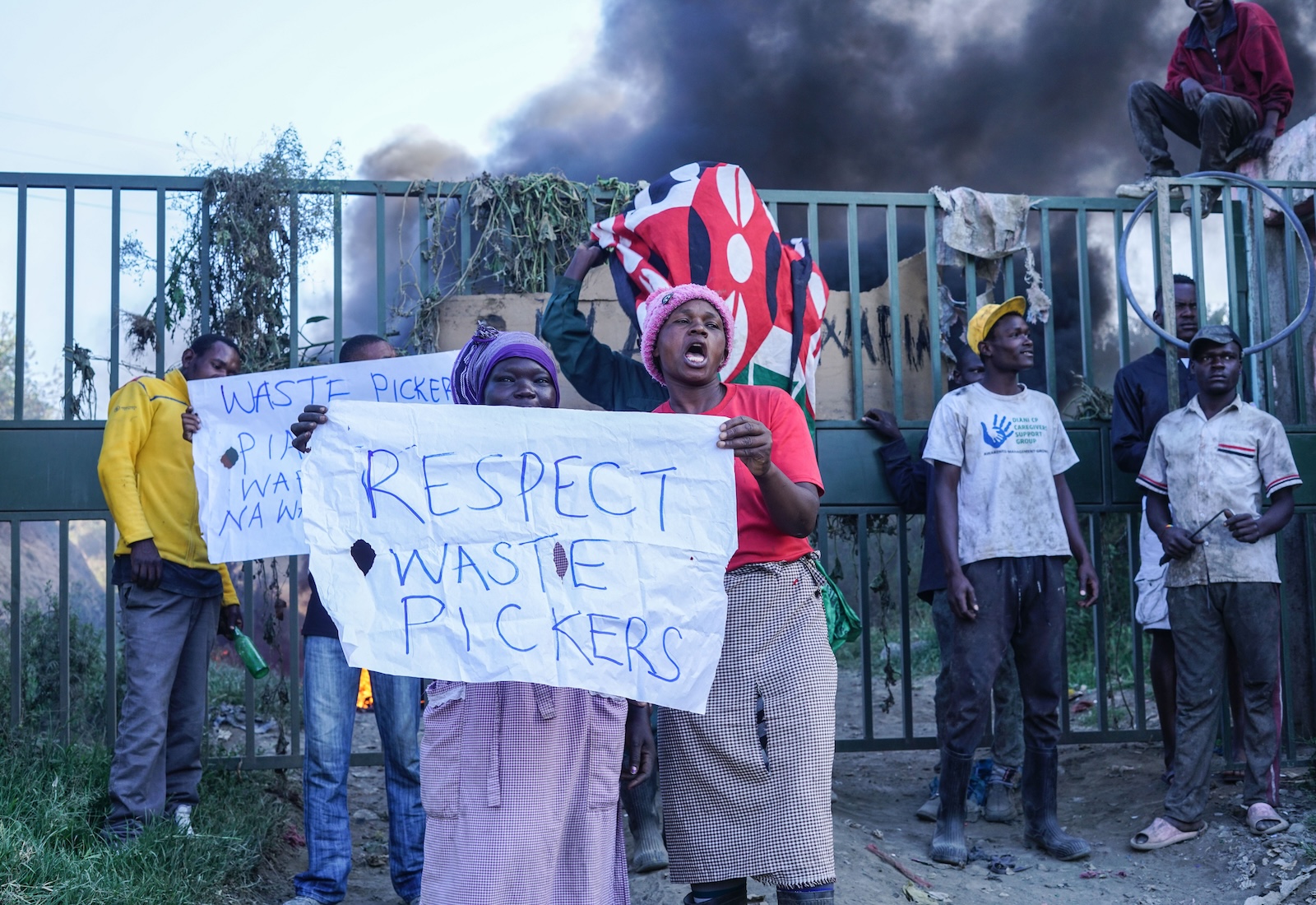
James Wakibia / SOPA Images / LightRocket via Getty Images
In some ways, the recently heightened recognition represents a success for waste pickers, who, through the IAWP, have systematically sought to elevate their profile throughout the treaty negotiations. That transnational plastic manufacturers and product companies feel compelled to at least allude to them in policy documents could be construed as evidence of the IAWP’s growing power and influence.
Still, observers to the treaty negotiations are concerned that all of the talk won’t translate to action. “There is always the question: Is this strategic, or are we just giving them the opportunity to twist our demands?” said Andrea Lema, the global waste picker support coordinator for the nonprofit Global Alliance for Incinerator Alternatives. She and others worry that the private sector is taking advantage of waste pickers, disingenuously expressing concern for them in order to appear more virtuous than they really are and boost their reputations in the minds of consumers.
Soledad Mella, president of Chile’s main waste picker collective, has attended all four of the plastic treaty negotiating sessions so far, and has experienced this tension firsthand. She said she’s wary of corporate greenwashing from companies for whom waste pickers have long provided a free cleanup service. But at the same time, these companies should be concerned about waste pickers, and some of them — mostly the consumer-facing brands that sell plastic products — have genuinely helped to amplify waste pickers’ demands through their own PR efforts and submissions to the U.N.
Coca-Cola, for example, has been listed as the number one plastic polluter for six years in a row, based on crowdsourced data from public litter cleanups. But Coke representatives have spoken alongside waste pickers at negotiating session side events, and together with Nestlé, PepsiCo, and Unilever, the company has launched an initiative to extend the U.N. Guiding Principles on Business and Human Rights to the informal waste sector.
Whether such initiatives will translate to real change for waste pickers is an open question. But the IAWP considers it important to be in conversation with these companies, given the strong hand they could have in redesigning waste-management systems through extended producer responsibility laws known as EPR. These laws, broadly supported by treaty negotiators, seek to make companies financially responsible for the waste they produce. Under some scenarios, this could involve providing compensation and other support for waste pickers.
“Companies have a role to play using their leverage to ensure we are being compensated and included in EPR planning and implementation,” said Johnson Doe, founder of the Green Waste Pickers Cooperative in Ghana. His work involves going door-to-door throughout the capital city of Accra to pick up people’s recyclable waste. Others in his organization make daily trips to a landfill in Accra to scavenge, sort, and sell recyclable materials.
Involvement in new or improved EPR systems is part of Doe and the IAWP’s principal demand for a “just transition” for waste pickers, a deliberately broad term for policies that recognize and protect waste pickers’ rights as the waste-management sector develops. Crucially, this includes formally integrating waste pickers into government waste-management systems — officially hiring them to provide some of the waste collection services they have already been offering for years. Being on a city, county, or state payroll could deliver such benefits as job security, living wages, health care, and worker protections.
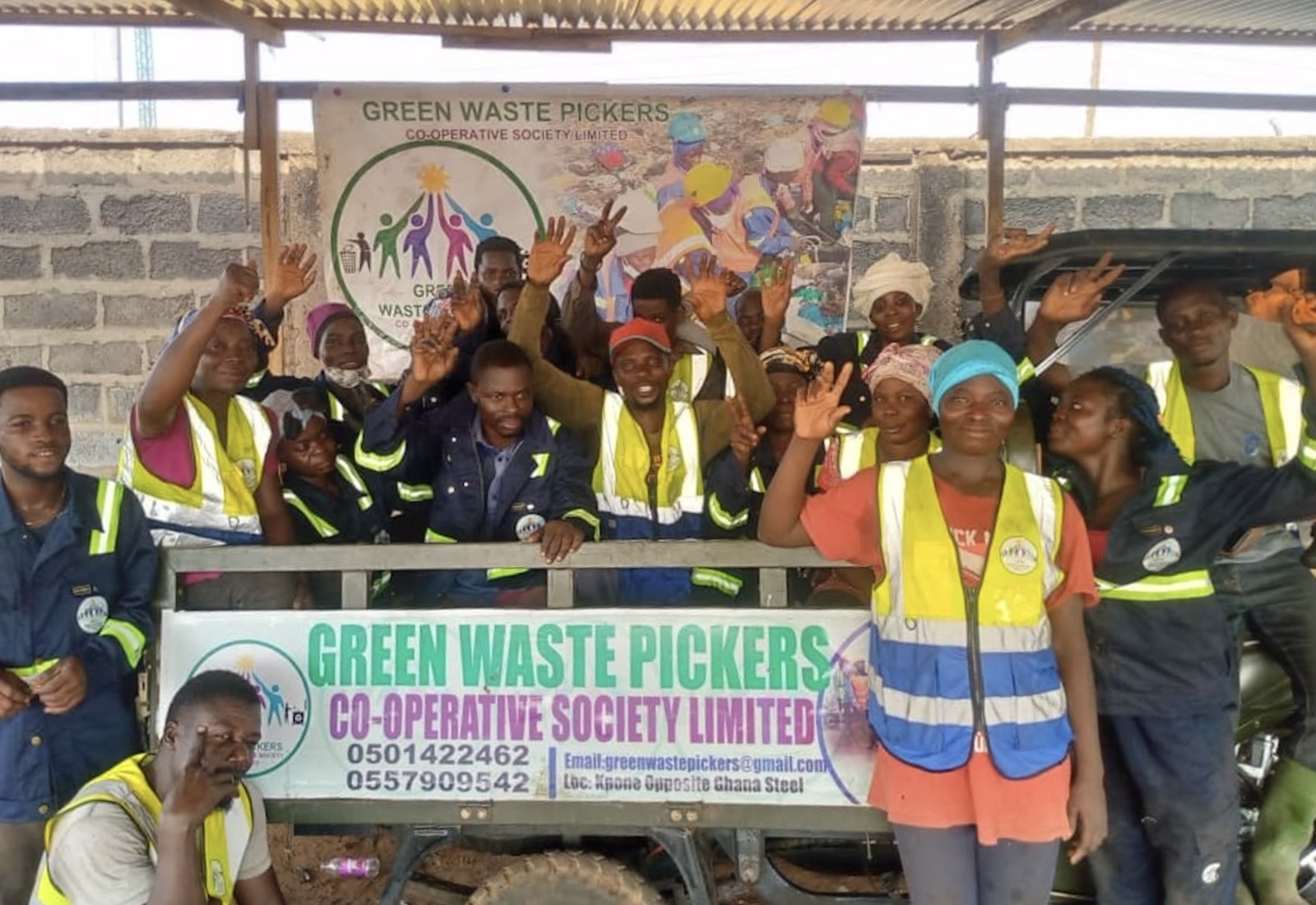
Courtesy of Johnson Doe
Other just-transition policies might involve formalizing waste picker-led programs to repair broken products or deliver reusable containers to people’s homes, which have the added benefit of reducing the need for new plastic production.
Carsten Wachholz, of the Business Coalition for a Global Plastics Treaty — a consortium of more than 200 food and beverage companies, retailers, plastic producers, and other enterprises — said his organization began engaging with the IAWP at their request, and that the two groups agreed to consult each other when developing policy recommendations and position papers. He said he didn’t want to speculate on the intentions of individual companies to support waste pickers, or whether their treaty engagement will translate to tangible improvements for waste pickers. “This will very much depend on how countries will implement their obligations under a future treaty,” he told Grist, “and if dedicated support for ensuring a just transition can be mobilized.”
Charlene Collison, secretariat of the Fair Circularity Initiative — the business and human rights endeavor that Coca-Cola helped launch — said she could not speak on behalf of individual companies but that the initiative’s members have broadly agreed to improve waste and recycling value chains “in robust consultation with stakeholders,” including waste pickers. Earlier this year, the organization published a report offering governments and companies a methodology for determining a baseline living income for waste pickers.
A Coca-Cola spokesperson did not directly respond to questions about greenwashing but pointed to its participation in the Fair Circularity Initiative, the Business Coalition for a Global Plastics Treaty, and the Responsible Sourcing Initiative, an effort to “improve livelihoods” of waste pickers through research and investment.
While Doe said that he and the IAWP are prepared to work with consumer goods companies and hold them accountable for the pledges they make, companies higher up the plastics value chain — the petrochemical producers and trade groups that say they want to “uplift” waste pickers — are another matter.
“They are a lost cause,” he told Grist, describing a fundamental mismatch between the industry’s objectives and those of waste pickers. For example, the petrochemical industry does not support limits on plastic production — in part, according to one waste picker Grist spoke with, out of an insincere concern that making less plastic would deprive waste pickers of their livelihoods. Waste pickers say they have plenty of plastic trash to collect already; even if they ran out, it would be easy to switch to other materials like aluminum cans or cardboard.
The petrochemical industry also opposes additional restrictions on hazardous chemicals used in plastics, an important priority for waste pickers since they are chronically exposed to these chemicals through their work.
Mella, the waste picker from Chile, said the idea that petrochemical companies support waste pickers is “laughable.”
“It’s super nice and super interesting for them to say, ‘We the petrochemical industry are very concerned about what’s going to happen to waste pickers,’” she told Grist in Spanish. But those statements are “obsolete” when considered alongside the industry’s plans to dramatically ramp up plastic production and its promises to deal with the resulting waste through unproven technologies like so-called “chemical recycling,” a suite of technologies that the industry says can melt down plastics and turn them into new products in an endless loop. Investigations from Reuters, Beyond Plastics, the Natural Resources Defense Council, the Global Alliance for Incinerator Alternatives, and others have shown that, of the handful of chemical recycling facilities in the U.S., none operate at full capacity and most turn plastic into chemicals or fuel to be burned.
To Mella’s knowledge, no petrochemical industry group has reached out to the IAWP to develop policy positions that would benefit waste pickers. Mella said the industry’s discourse is mostly about boosting business. It “has nothing to do with waste pickers’ social, economic, and cultural reality,” she told Grist. “There is zero chance of us ever aligning our position with that of the petrochemical industry.”
In response to Grist’s request for comment, Matthew Kastner, a spokesperson for the International Council of Chemical Associations, or ICCA, said that his organization is advocating for measures that would support waste pickers, such as design principles to make plastics more easily recyclable, recycling targets that could drive up demand for waste pickers’ work, and chemical recycling — which he said could lead to more types of used plastic having greater value in the future.
“Altogether, there is a potential to increase the value and volume of plastics that waste pickers can profit from, and ICCA hopes to be able to collaborate with waste pickers in a responsible and mutually beneficial manner,” Kastner told Grist. He listed a handful of initiatives around the world where industry groups are engaging with local waste picker organizations, including one to integrate waste pickers into South Africa’s formal waste-management system and another to provide $230,000 to “boost recycling cooperatives and promote a humanized circular economy in Brazil.”
Plastics Europe, a trade group representing the continent’s petrochemical manufacturers, told Grist: “We indeed recognize this complex situation and urge continued discussion involving all relevant actors as the treaty process continues,” and declined to comment further. American Fuel and Petrochemical Manufacturers did not respond to Grist’s requests for comment.
According to Lema, with the Global Alliance for Incinerator Alternatives, one reason companies have been so quick to latch onto waste pickers is because they represent a more human side of the plastics issue. “When you’re talking about waste pickers, you’re talking about the lives of the people behind the treaty,” she said.
To be sure, it’s not just the private sector that waste pickers have to worry about. Although the waste pickers and advocates Grist spoke with voiced concerns about industry invoking their name and demands, there have also been tensions with nongovernmental organizations. Mella said she’s seen “real alignment” with environmental groups, but only about half of them are incorporating the IAWP’s demands about a just transition for waste pickers into their policy positions. The rest are more single-mindedly focused on limiting global plastic production.
Cass Talbott, with the IAWP, said she’s most concerned with the positions of member states, since these are the stakeholders who will be directly responsible for determining what makes it into the final treaty text. She said she’d like to see greater specificity from any group that alludes to waste pickers as part of the treaty negotiations, and, where appropriate, for stakeholders to get in direct contact with the IAWP if they intend to invoke the rights and interests of waste pickers.
“We are willing to be at the table — we don’t want to be appropriated,” she told Grist.
A 48-page policy document from the IAWP lists dozens of ways that waste pickers’ rights and interests have already been honored in jurisdictions around the world — for example, in Belo Horizonte, Brazil, where waste pickers’ role in waste management was recognized in the municipal constitution passed in the 1990s, and in Portland, Oregon, where an organization called Ground Source Association has secured contracts with city, county, and regional authorities to allow the formal employment of nearly 50 waste pickers.
Enshrining similar victories at the global level will require more than just words of support. Cass Talbott said one of the IAWP’s main priorities at the next and final round of treaty negotiations this November will be to ensure that an article on a just transition makes it into the final draft.
“There’s been some greater will among governments to support the just-transition article and measures throughout the treaty,” she said, “and other stakeholders have to show up for it at this point.”

